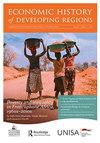Inequality of education in colonial Ghana: European influences and African responses
IF 0.8
Q1 HISTORY
引用次数: 2
Abstract
ABSTRACT How and why did African households under colonial rule make the decision to educate their children or not, and how did this micro-level decision making affect the diffusion of education in colonial Ghana? This paper addresses these questions and shows that many households were reluctant to enrol their children in school because the costs of colonial education were prohibitive, and the benefits were limited. Unemployment of school leavers was a major social problem throughout the colonial era and returns to education did not justify investments in education. The demand for education was relatively high in areas where the demand for skilled labour was high, and from the late 1930s when there were growing pay-offs to colonial education. Overall, the paper points to the need to examine interactions between supply and demand factors in order to understand variations in human capital accumulation in sub-Saharan Africa.殖民时期加纳的教育不平等:欧洲的影响和非洲的反应
殖民统治下的非洲家庭如何以及为什么会决定是否让孩子接受教育,这种微观层面的决策如何影响加纳殖民地的教育普及?本文解决了这些问题,并表明许多家庭不愿意让他们的孩子上学,因为殖民教育的成本令人望而却步,而收益有限。在整个殖民时代,辍学者失业是一个主要的社会问题,教育的回报并不能证明投资教育是合理的。在对熟练劳动力需求高的地区,对教育的需求相对较高,从20世纪30年代末开始,殖民地教育的回报越来越高。总体而言,本文指出有必要研究供需因素之间的相互作用,以了解撒哈拉以南非洲地区人力资本积累的变化。
本文章由计算机程序翻译,如有差异,请以英文原文为准。
求助全文
约1分钟内获得全文
求助全文

 求助内容:
求助内容: 应助结果提醒方式:
应助结果提醒方式:


